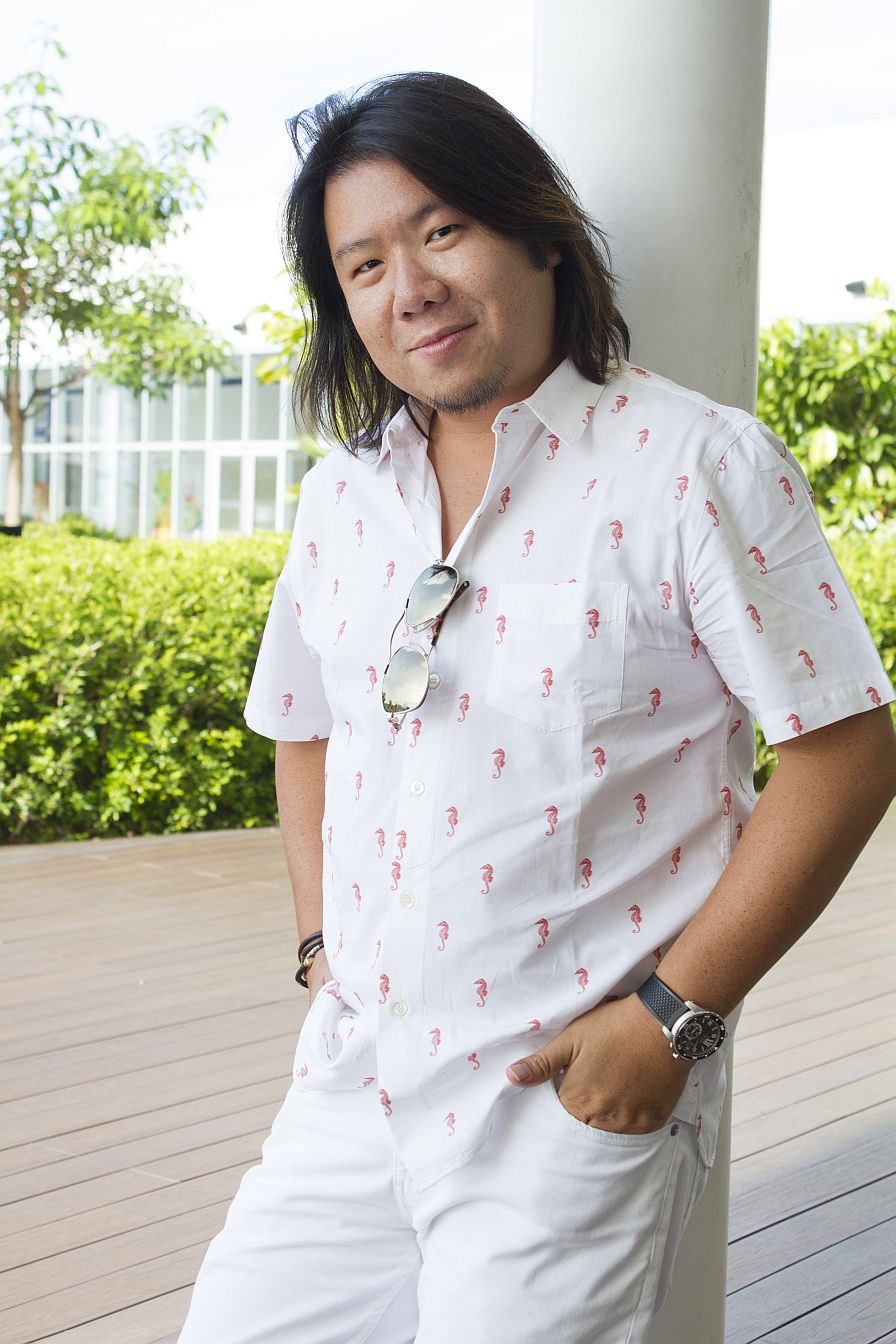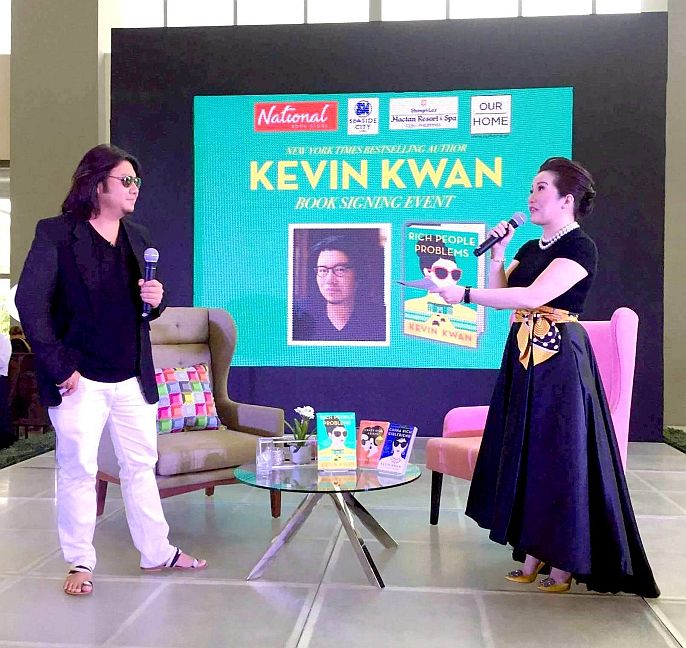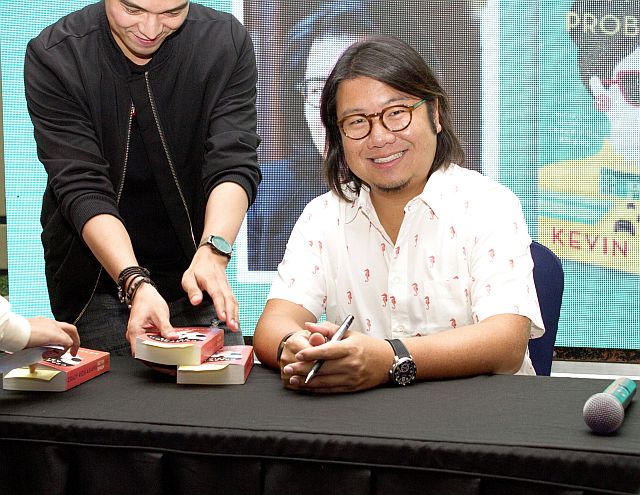New York Times bestselling author of the book series “Crazy Rich Asians,”
“China Rich Girlfriend,” and “Rich People Problems” Kevin Kwan made Queen City the last stop of his whirlwind book tour in the Philippines with the filthy rich and insanely famous Queen of All Media Kris Aquino —who might as well be a character in his plot come to life—in tow, the island was abuzz with feverish excitement.
As most may already know, the book series shines the spotlight on the crazy and colorful exploits of the—at times—loud and ludicrous, but mostly loaded and landed fictional characters from Asia’s social set.
Brought in by National Book Store to promote the latest installment of his trilogy, Kevin charmed Cebuanos and visitors alike for what looked, by all accounts, to be a banging book blast that included a press conference, and a meet and greet and book signing event at SM Seaside City Cebu.
Nothing had changed about the smart author since we first met him for an interview two years back while he was promoting his second book. He still had the same longish, ebony locks, and the same cheery, chinky eyes that disappeared when he smiled.
He still spoke in the same low, hushed tones and kept the same dignified mien that made him so interesting.
While one glance at his Instagram account now reveals his strong fondness for the Philippines via tiles of photos and videos matched with heartfelt captions that has the usually staid and collected writer expressing his ardent appreciation for the attention he’s gotten from his Filipino fans through his books and upcoming movie, Kevin remains the masterful storyteller that he is, whether on paper or in person.
Play! catches up with the author du jour and discovers how he became one of a handful of Asian authors to have his book turned into a major Hollywood movie that’s slated for worldwide release, and how his affection for the Philippines eventually ended with one Kris Aquino playing a much-talked about, sensational role in the film adaptation of his debut novel.
How crazy rich are you?
I am not crazy rich at all. I’m a writer. Writers are not part of this crazy, rich world.
What do you think is your niche in the writing industry after writing three books with a satirical vibe?
I do think that I’ve become known for this comedy of manners—these satirical novels set in Asia. I’m hoping to really change that. I’ve written three books but I really want to show the world that I have much more to say. And, it’s not just about crazy rich Asians.
What inspired you to create these characters in your novels?
When I first began writing them, I was really trying to write from a place of memory, and inspiration, and truth. A lot of it is inspired by my childhood in Singapore so naturally that meant a lot of Singaporeans. But because my family was also very international. My relatives moved to Hong Kong, Thailand, Australia. I got a chance to travel to those places and meet these people. Everyone’s all over Asia and all over the world but they tend to be Asian so I guess in that way, it was a natural diversity that happened.
Are the novels based on your life?
No, definitely not. I am not Nicholas Young, although sometimes I wish I was. There are a lot of stories that are really inspired by things I’ve witnessed or stories I’ve heard about my family over the years. But there’s not one story that’s all about my life. Not at all.
How much is fact and how much is fiction in your books?
For the first novel, the way I began writing it—they were really a collection of short stories. One day, I would write one short story about Eleanor Young, for example, Nicholas Young’s mother. The next day, let’s write a story about Astrid Leong, who was a cousin of the family. They were just a collection of stories and memories. Nothing is really based on fact, per se. They are stories stitched together, inspired by things I remember from my childhood—not necessarily that they’ve happened to me. Alot of it is inspired by true events that have happened to other people, other families. A lot of the stories, especially for Singaporeans, are very recognizable because there are a lot of famous family scandals, things like that. For Singaporeans, it was really a surprise. It was almost like a tribute to all the drama—and melodrama to these society scandals.
Did you envision this to be a trilogy?
Or was it a decision you made along the way? It was always my plan and my hope to make it a trilogy because I knew the full story I wanted to tell. But, of course, publishers only sign you up one book at a time. They want to make sure the first book works. Even the second book—we did it one book at a time, basically.
Did you ever anticipate that it would get this big?
No, I never expected it to ever get to this point. This is really beyond my wildest dreams. I’m really lucky. You know, I think it could have happened to many other authors writing today. But it was just a matter of timing and a confluence of events. It was the right time I think that people in the West especially, and even people in Asia were interested in reading about this subject matter. So I often wonder ‘If I did the first book ten years ago, would it have been as successful?’ I don’t know. Again, I just feel very lucky. Thank you.
Did it occur to you that you’d get a following from the younger set?
I really didn’t. And that’s a surprise. Actually, that’s not even specific to the Philippines because in the U.S., I am meeting younger and younger readers. ‘Oh my god, are you sure?’ As a parent, I don’t know if I would want my 10-year old reading these books.
Do you have a favorite among the three?
Interesting. You know, right now my favorite is the most recent one, the third one because it’s the freshest to my mind. I just actually finished writing it back in April.
How long did it take you to write the last book?
From April to now —they immediately went to print. I only had eight months to write it from the time—because I was so busy doing these other things, and I was like ‘Are we going to make this happen? Let’s try to make it happen for this summer.’ It was like running a marathon.
Of the three books, which gave you the hardest time?
“China Rich Girlfriend,” the second one. Because it was set in Mainland China. It was about Mainland China’s rich, who are super rich, so much richer than all of us. And I wasn’t a part of that world. I was an outsider. It was much harder compared to Singapore.
Why was the follow-up novel the most difficult book to write?
Because I don’t know China that well. Singapore, Hong Kong, other parts of the world I am so familiar with the cultures there, the societies there. China was a closed culture, until twenty years ago. And so, I didn’t start going until the last 10 or 15 years. I didn’t know it so well. It’s not a second home to me in the way that Hong Kong and Singapore are. It was harder to infiltrate that world.
Can you describe your creative process?
For the first two books, I actually created a system that was very rigid. I would only write in the corner of my living room in New York. We all live in very small apartments so my desk was set up in the corner, and I wrote there. I had a very disciplined schedule of only writing in the morning. I’d write for 3 hours, take a break, and do all the afternoon work—the office work that I had to do. In the evening, I’d write again for a few hours. I never thought I could write anywhere else. For the last book, I actually began writing it on my laptop, which was new for me. And then I would venture into different cafes. After writing two books sitting in the corner of my living room, I needed to venture out. And I found to my surprise that I could write in a cafe with lots of things happening—the crowd, the espresso machine churning coffee. And it was actually nice to be out there. It kept me motivated—to be in a space where there is energy around you. It’s become much more adaptable now—my writing process. It’s exciting because now I can travel and write and not just be stuck in my living room corner.
You mentioned that there is a fourth book. Is it still part of the series?
No, it’s going to be a whole new book. I am under contract to write one more book for Penguin Random House. I have the whole idea—I just have to find the time to write it.
Are your rich friends more careful around you now?
If they are, they’re very diplomatic about it so I wouldn’t even know. Maybe there are a lot of stories I don’t hear anymore.
Do your friends enjoy being an anecdote in your books?
You know, no one—out of my friends—has their stories told in my books. So it’s not like I’m exposing anyone’s secrets or anything like that. The stories I tell are pretty familiar to most people already.
Which do you like better: books or films?
Books.
Of all the characters you made, who can you most relate to?
Alistair Cheng.
Which one do you hate?
I don’t hate anyone because I created them. They’re all my babies.
What’s the most millennial #RichPeopleProblem gripe that you’ve heard?
I did hear from a millennial Crazy Rich Asian who complained to me—this person was staying in one of the nicest hotels in the world. Actually, he was on vacation and he said to me, “Ugh. It really sucks when the hotel room is not as nice as your own bedroom at home. I was like, ‘You are slumming it. Ok, time to cut your allowance.’
What brought about this fascination you have with Philippine high society?
I thinks it’s always interested me because there’s such a diverse mix of people here. There’s the Filipino-Chinese, that’s one faction of Crazy Rich Asians. And then there are the other families mixed with Spanish blood like the Zobels—people like that. I just think it’s fascinating—the history of wealthy families that have helped to build this country. It’s sort of similar to Singapore where you have a few families that have spent decades sort of creating the country. That’s always fascinating to me.
The first time you were in the Philippines was in 1997, and then you came back in 2015. What was the difference between the two timeframes?
The first time I was here, I was hosted by some friends. We were much younger then. This was my college days. So we never saw the sunlight. We were clubbing. We were going to parties. There were all these bands we went to listen to, that my friends were friends with. And I had my complete baptism of fire in the nightlife scene in Manila. It was so much fun back in those days. We would go clubbing from twelve midnight to five in the morning and we would sleep all day. In 2015, I saw the sunlight—-a lot of it. I really got to see the country a lot more. I got to visit Palawan and really spend more time with different types of people versus this fun, very nice party crowd. That was just one cross-section of Manila society.
You were hosted by these rich Filipinos from high society. Did they know they were going to end up in book three?
No. I mean, I came for book two to tour and was welcomed so warmly by some lovely people and actually developed friendships with them that have continued after I left the country. I just thought because I was setting up a few scenes here, it would be fun. And in all my books, I really play these name games. Where every name–you’re probably not familiar with them because you’re not familiar with Singapore society, but every name is a play on famous people there. For a few famous people, their names are joined together. I do that throughout the books with all different types of people—Singaporeans, the Hong Kong society, even some New Yorkers show up in the books. And so, I did the same for my new Filipino friends. I played the name game, changed the names somewhat, and thought I’d just have fun with it. Now, wherever I go, the friends discover this themselves in my books–you know it’s a fun, little treat to see a version of yourself in the books. And I never use the real names. With the exception of Karen Davila. I thought she’s too famous so it doesn’t really matter.
Palawan figures prominently in “Rich People Problems.” Was this all research or did you go there yourself?
I did go there myself. I go everywhere that I write about in my books. There’s not a place or a space or anything I have not myself seen. I’ve breathed the air, seen the room, the country or space. So I had to go to Palawan and kind of really immerse myself there. That’s my research—travel!Tell us about how you fell in love with our garlic rice. Garlic rice! It was my first time, two years ago, in the Philippines and I was like “What a great invention! Fry garlic and rice together.” No-brainer. Now, I have it every time.
Tell us why you say this is historical for an Asian film.
It really is. It is the first Hollywood film in 26 years with an all-Asian cast. The last one was Joy Luck Club. And before that, The Flower Drum Song which starred my cousin Nancy Kwan. So, there are really only 2 Hollywood movies before this that had an Asian cast. This is also the first ever Hollywood romantic comedy with Asian lead stars.
How involved were you with the movie?
I was very involved. From the beginning, I was involved in casting, in choosing the actors.
How was the process of casting like?
Casting began two years ago. The complete cast was finalized late last year.
How did it happen that you cast Kris Aquino for a role in your movie?
She was a name I put on a list. And I said, “We need to have her.” The Philippines is such a big part of Asia. There are so many talented Filipino actors that really deserve to be showcased on the global stage, and if there’s any way I can help, I’d like to do that.
Was it a conscious decision, was it part of developing the third book, or did the opportunity just really present itself to make Kris Aquino a part of the movie?
I would say it was serendipity. It all worked out. The stars aligned for us to have Kris in the movie at the right moment. I think we are very lucky to have her in the movie.
What stage is the movie in now?
It’s done. Production is done. They are editing the movie now. It took two months. It wasn’t that quick.
How did you feel when Crazy Rich Asians was turned into a movie?
It was just unbelievable to me. Giddy is the word because every day, I’d be watching audition tapes or hearing from the producers like “Oh my god, we got—we have this person. You need to see the audition. You have to see this.” It was just a dream come true. Everyday, there was a different development. And, I knew so early but we couldn’t tell anyone until they’d officially announce the names of the cast members months later. I had to keep a lot of secrets. And so, it was always very nice when the press would release ‘Harry Shum is in the movie.’ And I can say, ‘Oooh, I can finally say Harry Shum is in the movie.’
What do you hope for your readers to take away from all of this, aside from all the crazy stories and the fun anecdotes?
I just really hope to entertain people. I hope people laugh, and have some joy. I hope it makes them think and really decide for themselves what they want to take away from it—whether money is worth the price.
What is your message to everyone through your books and the movie?
I think through this, everyone will see what they want in life—whether they want to be a part of this world or if they’re happy where they’re at.
Your parting shot to your Cebuano fans?
The best lechon is here from what I hear. I can’t wait to try that.




